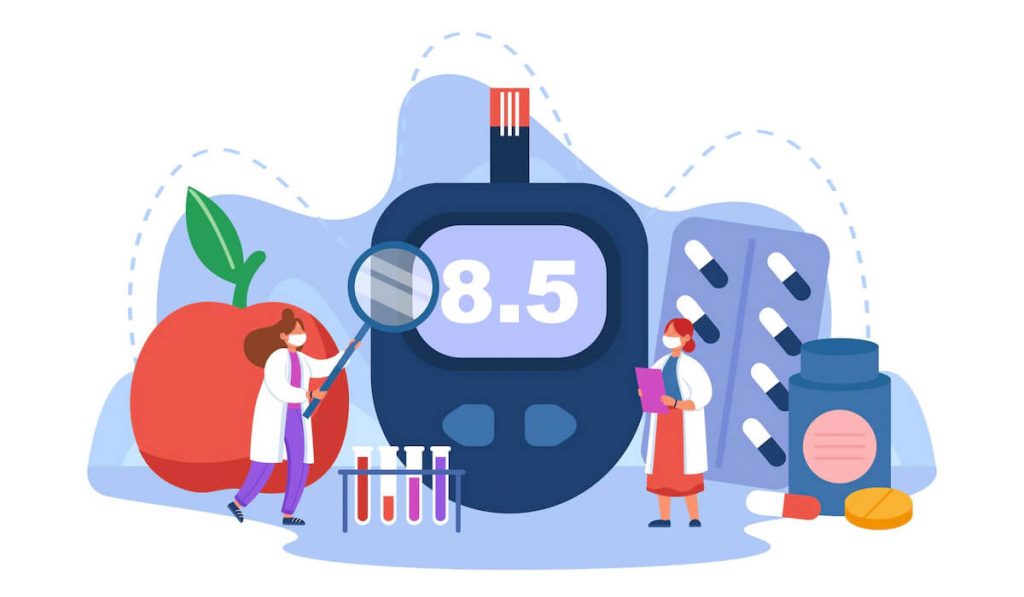
Avoiding the Spooky Health Complications of Diabetes 😱
There are quite a few serious complications that people with diabetes are at an increased risk of experiencing. All of these complications can be prevented with blood sugar control, managing your blood pressure and cholesterol, and having annual doctor visits.
Read on to learn more about some of these spooky complications and how to make them less scary.
Complications of Diabetes
💀 Cerebrovascular Disease (aka Stroke) and Cardiovascular Disease (aka heart attack)
High blood sugars make your blood vessels more sticky and make you more prone to plaques forming inside your blood vessels. These can break off and block smaller blood vessels, or they can rupture and cause vessels to leak. This can lead to tissue death in your brain or heart depending on where the block happens.
💀 Nephropathy (aka diabetic kidney disease)
This is when the kidneys leak protein into the urine. This means that they are not functioning as well as they have in the past. Diabetes is one of the leading causes of end-stage renal disease and dialysis.
💀 Retinopathy
Retinopathy is damage to your retinas, the nerves in the back of your eye that help you see. Diabetes can lead to blockages of the small blood vessels in the back of your eye. When these are blocked, your brain works to make more vessels to ensure the eye can get the nutrients it needs, but these new vessels are very fragile which makes them more likely to leak or break. When these vessels are damaged it leads to vision loss, black spots, and blockages in your vision that slowly get bigger and can eventually lead to complete loss of vision.
💀 Neuropathy
Neuropathy, or nerve damage, is one of the more well-known complications that can happen with diabetes, but it’s more than just a loss of feeling in your fingers and toes. This nerve damage can eventually lead to affecting your autonomic nervous system which affects your organs. This can lead to hypoglycemia unawareness, where your body cannot tell you your blood sugar is low.

Preventing Complications
📌 Thankfully, there are quite a few ways to try and prevent these complications from happening. The first one is ensuring you manage your diabetes daily, including controlling the ABCs of your diabetes. Don’t wish you controlled your diabetes sooner once a complication has happened, make changes now. It’s also important to get a diagnosis of diabetes as early as you can with A1C checks. Usually, you will start getting your A1C checked yearly once you hit 45, but consider getting yours checked early if you are overweight, have high blood pressure, or high cholesterol, family history of diabetes, or have gestational diabetes.
📌 Eating healthy and exercising can help prevent these complications as well. Try to exercise at least 150 minutes every week with cardio exercises, and do at least 2 rounds of resistance band exercises at least twice a week. Managing your weight can also lower your risk for complications, either keeping your weight stable or losing weight if you are overweight. Nicotine alone puts you at an increased risk for heart disease, so smoking cessation can decrease your risks by a good amount as well.
 In addition to checking your A1C every 3 to 6 months, here is a list of other tests that you should have done at least annually in order to prevent these spooky complications:
In addition to checking your A1C every 3 to 6 months, here is a list of other tests that you should have done at least annually in order to prevent these spooky complications:
- Blood pressure
- Cholesterol
- Urine test to check for protein
- Dilated eye exam
- Foot exam by the doctor, along with daily personal foot checks each day
- Dental exam
Summary Diabetes can lead to lots of complications, like nephropathy, cardiovascular disease and more. High blood sugar is the one of the biggest reasons these diseases can occur, since these sugars can lead to blood clots and vessel leaks. There is no way to reverse the damage that has occurred in your body from these complications, but there are plenty of ways to prevent it from happening in the first place and to slow down disease progression. Don’t wait until it’s too late to take charge and put a halt to these spooky health complications.






